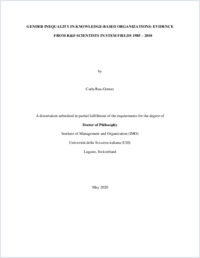Gender inequality in knowledge-based organizations : Evidence from R&D scientists in STEM fields 1985 – 2010
- Rua Gomez, Carla Carolina
- Carnabuci, Gianluca (Degree supervisor)
-
29.06.2020
185 p
Thèse de doctorat: Università della Svizzera italiana, 2020
English
This dissertation examines how intra-organizational networks interact with individual and macro-level characteristics to affect employees’ innovativeness and access to social capital in knowledge-based organizations. Primarily, my dissertation focuses on how such intra- organizational network dynamics limit or perpetuate gender inequality in the workplace. For example, I demonstrate that to enter the collaboration network of a high-status colleague, men and women need to follow different strategies. I also show that three employees’ characteristics, namely gender, tenure, and position in the intra-organizational network, explain why some individuals are more innovative than others in gender-diverse organizations. Besides demonstrating how individuals’ networks interact with individuals’ characteristics to explain gender disparities in the workplace, I explore how regional-level factors affect differences between men and women in organizations. In particular, I show that the level of gender bias in the region in which an organization is located affects gender performance gaps within organizations in that region. Therefore, I provide new insights into the mechanisms by which gender inequality persists in knowledge-intensive organizations, and it suggests possible avenues to overcome such gender disparities.
- Language
-
- English
- Classification
- Economics
- License
-
License undefined
- Identifiers
-
- RERO DOC 328684
- URN urn:nbn:ch:rero-006-119935
- ARK ark:/12658/srd1319113
- Persistent URL
- https://n2t.net/ark:/12658/srd1319113
Statistics
Document views: 365
File downloads:
- Texte intégral: 305
